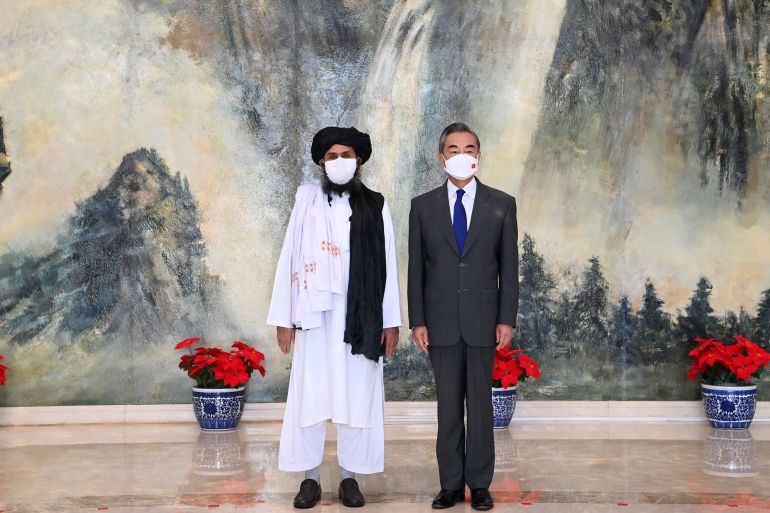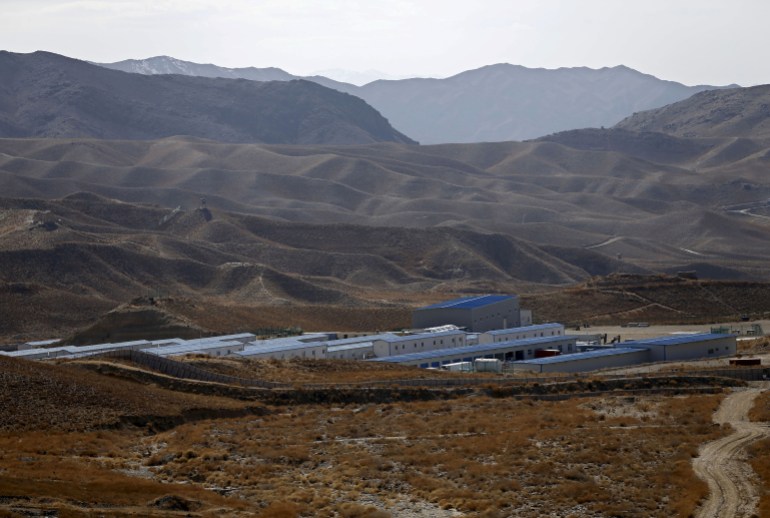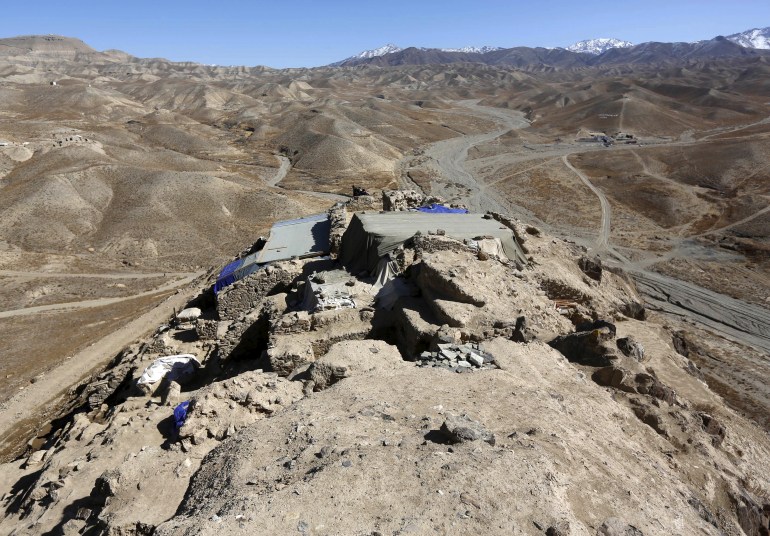China seeks stability in Afghanistan before economic dialogue
While China’s foreign affairs officials are signalling friendship and cooperation, it will take much deeper action on the ground to move anywhere near real engagement.

Shenzhen, China – In the coming weeks and months, if not years, China will need to walk a tightrope related to economic and security engagements in Afghanistan or risk the fate other major powers have suffered by engaging in conflicts that drained them financially and at the cost of many lives.
China’s concerns over stability in the region and the potential for a security vacuum that emboldens militants there outweigh a desire to tap into Afghanistan’s mineral wealth and further advance regional infrastructure connections through the area in the near term.
Keep reading
list of 4 itemsWhat does the Taliban’s return to power mean for Afghanistan?
EU says will work with Taliban only if rights are respected
Transcript of Taliban’s first news conference in Kabul
The sudden takeover of the country by Taliban forces, two weeks before United States troops were meant to fully withdraw after nearly two decades of conflict there, has placed China in an uncertain position as it attempts to determine how to deal with its new neighbours in power in Kabul.
“It is very important for China to see how the Taliban stabilise the situation,” Zhang Li, a professor at the Sichuan University’s Institute of South Asian Studies, told Al Jazeera. “I think the most important step is political reconciliation. Talk of major economic engagement is too early.”
Meetings between Taliban leadership and China’s Foreign Minister Wang Yi at the end of July were important for laying the groundwork for further communication between the two parties, particularly for China in signalling its significant interests in a stable outcome as well as assurances on security, Zhang said.

Statements like the ones from China’s foreign ministry on Monday about maintaining “friendly and cooperative relations” with Afghanistan are likely to continue as long as the situation remains stable and the Taliban keeps its word about engaging with other political entities in the country.
“China made it quite clear that the situation on the ground needs to be stable, and that they want to see positive developments,” Zhang said. “If the Taliban can keep its promise properly and improve security, not allow militants to go against other countries, including China, I think it’s quite possible for China to consider economic engagement, in a big way.”
Future governance
For now, though, China will be watching to see what form of government emerges, in what manner the Taliban wields power, and whether or not it forms an inclusive government.
Such actions could lead to diplomatic recognition for a Taliban-led government on the part of countries like Pakistan, Russia and China – a possible significant early step to longer-term engagement, according to Andrew Small, a senior fellow with the Asia programme at the German Marshall Fund, currently based in Berlin.
“They don’t want to be stuck dealing with a kind of pariah state again in their neighbourhood,” Small told Al Jazeera. “I think they do see this as a window where if there is a government that can last, it needs to be something where there is some sharing of power with other political forces.”
While China may like seeing the US out of its backyard, it may be underestimating the extent of the challenges that it faces in Afghanistan largely due to its reliance on Pakistan for information about the situation there, Daniel Markey, director of the Global Policy Program at Johns Hopkins School of Advanced International Studies, told Al Jazeera.
“There is a kind of a triumphalism about what’s happened, and an expectation that China could perhaps, in a way, swoop in and pick up the pieces,” Markey said based on commentary he’s been observing from some Chinese experts. “If they actually believe that, they’re going to be in for a rude shock, if not immediately, then over time.”
The Taliban will likely need to cooperate with a range of constituencies within Afghanistan, both because of outside pressure to do so, and because the movement lacks the manpower to pacify and run the country well, Markey said.
“If it doesn’t devolve into an outright civil war they’re going to have to grant a great deal of autonomy to different regions,” he said. “This presents China with the possibility of cultivating ties with certain segments of society, but also creates the risk of pockets of threats for China.”
Raffaello Pantucci, a senior fellow at the Rajaratnam School of International Studies based in Singapore, told Al Jazeera that Chinese authorities are “fairly clear-eyed” about what they’re dealing with in the Taliban and that claims that Chinese investment could soon start to pour into the county are wildly overblown.
“Why do we now suddenly think that Beijing is going say, ‘Oh, now everything’s rosy let’s go rushing in and you know, mine lithium in Helmand [province]’ which is, you know, an incredibly rural place with no infrastructure to speak of?” Pantucci asked.

Pantucci pointed to two better-known major investment projects – a contract with a Chinese state-owned company to develop a copper mine in Mes Aynak in 2007, and a tender for an oil field project in Amu Darya with China National Petroleum Corp in 2011 – that essentially went nowhere close to being developed.
“Even with stability previously, it wasn’t clear to me ever that the Chinese government was pushing its companies into Afghanistan at all,” he said.
A wait-and-see approach
If there are steps towards international recognition of a Taliban-led government in Kabul and the stability to maintain that, Small told Al Jazeera, it is likely China could create a sense that “there’s a lot more on offer further down the line,” he said, with the possibility of engagement on all kinds of investment discussions and short-term aid.
“The question, though, is really going to be on any of the serious longer-term projects, whether that’s the copper mine, or any major infrastructure connections and things, I think [China’s authorities] will just sit for a while and see what emerges,” Small said.
While China’s foreign affairs officials are signalling friendship and cooperation, it will take much deeper action on the ground to move anywhere near real engagement.
“I don’t see them trying to possibly have any greater confidence about the Taliban’s capacity to be a good partner, say of exploiting Afghanistan’s mineral wealth, than the last government,” Markey said. “The last government wasn’t great, but it was backed for 20 years by US security.”
Another major issue for China is whether the Taliban ascendance will embolden other militants in the region, particularly the Taliban in Pakistan, or any groups intent on using China’s repression and anti-terrorism campaign against its Uighur minority in the Xinjiang region as a rallying cry against the country.
“Terrorism is a big challenge for China, so that’s also something China is especially concerned about,” Zhang said of assurances the government in Beijing is seeking from the Taliban.
Yun Sun, director of the China Program at the Stimson Center, a Washington-based think-tank, said that the swift takeover had surprised everyone, including China, and much depends on what the Taliban does next.
“Whether it resumes its previous draconian policies or begins to moderate, and whether it maintains ties with and support of radical Islamic groups, especially the Uighur ones,” will determine relations with China and any economic engagement afterwards, she said.